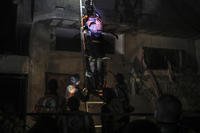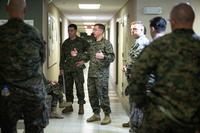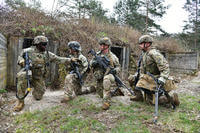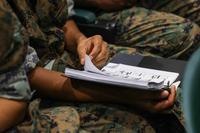A U.S. House of Representatives panel has denied an Army request to transfer funding from a battlefield communications network made by General Dynamics Corp. to pay for more urgent needs.
The House Armed Services Committee, headed by Rep. Howard "Buck" McKeon, R-Calif., rejected the service's attempt to transfer $128 million from the program, known as the Warfighter Information Network-Tactical, or WIN-T, this year as part of a larger Defense Department effort to shift $9.6 billion to pay for higher-than-expected war costs and other expenses.
"The committee recognizes the tactical network provides units with more channels for voice and data communications, increased security and enhanced mobile communications," McKeon and Rep. Adam Smith, D-Wash., the highest-ranking Democrat on the panel, wrote to Pentagon Comptroller Robert Hale in a letter dated June 21 and obtained by Military.com.
The move comes two months after the Falls Church, Va.-based defense contractor deployed hundreds of suppliers and dozens of lobbyists on Capitol Hill to argue against the Army’s proposal to shift funding from WIN-T and other acquisition programs in part to pay for the war in Afghanistan.
The service is facing a potential budget shortfall of more than $15 billion in fiscal 2013, which ends Sept. 30, top service officials have told Congress. More than half of that stems from war-related expenses, including higher-than-expected costs to remove equipment from Afghanistan.
Lawmakers and company officials said the Army's decision to cut funding from the battlefield communications network didn't make sense because the service itself has identified it as one of its highest priorities.
A group of 71 members of the House pressed the Pentagon to avoid transferring the funding for the program, according to a May 10 letter sent to Defense Secretary Chuck Hagel and obtained by Military.com. Of those, 44 were Democrats. The largest groups of signatures came from Arizona, where the General Dynamics C4 Systems unit is based, and Massachusetts, where program work is performed.
Reps. Joseph Kennedy and Niki Tsongas, both Democrats from Massachusetts who signed the letter, as well as Sen. Elizabeth Warren, D-Mass., who signed a similar letter, in a joint statement today welcomed the continued funding for the program.
"As the landscape of modern warfare gets more complicated and multi-dimensional – and as the technology used by our enemies continues to improve – ensuring communication on the battlefield is part of our responsibility to the men and women we put in harm’s way," Kennedy said.
Tsongas acknowledged the challenge that automatic budget cuts, known as sequestration, and other budgetary pressures pose for the Defense Department, "but slashing funding for the most critical R&D and procurement programs giving our military its competitive edge is not where we should look for savings," she said.
Chris Marzilli, president of General Dynamics C4 Systems unit, in an e-mailed statement said the company is "grateful for the efforts of the Massachusetts and Arizona delegations, who advocated tirelessly to stop this reprogramming action. This action demonstrates the broad support that exists for the soldier's network, but there is more work to do.
"It is now critical that the president's full request for 2014 funding be supported by the House and Senate in the upcoming budget process," he added. "The next generation of WIN-T will make our soldiers safer and more effective, and consistent funding will help us place this technology in the hands of active duty and National Guard soldiers as quickly as possible."
The Army requested a total of $1.23 billion for the WIN-T program in fiscal 2013, according to Pentagon budget documents. That figure includes $893 million for procurement, $278 million for research and development and $55 million for spares. It asked for $1.28 billion for the effort in fiscal 2014.
The second installment of the program, known as Increment 2, is estimated to cost $6.2 billion, a 64-percent increase in cost from 2007, according to a Government Accountability Office report from March.








